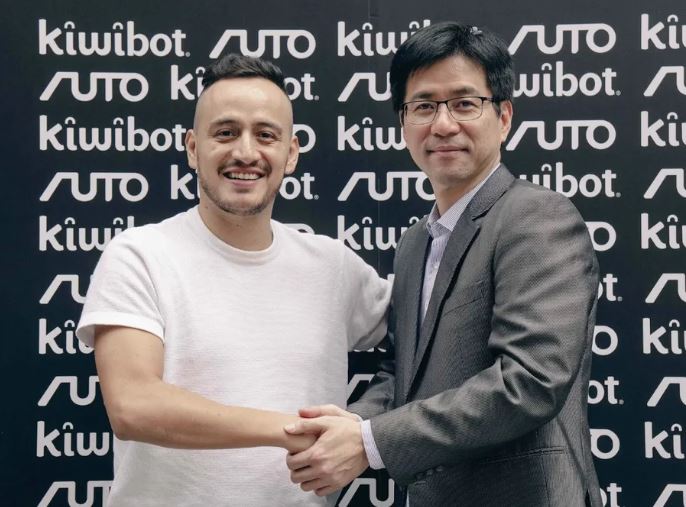US Self-Driving Delivery Startup KiwiBot Acquires Taiwanese Startup! Hinting at Shift in Production Focus to Taiwan - What's Behind the Move?

On April 3rd, the US-based food delivery robot startup Kiwibot announced its acquisition of Taiwanese startup, AUTO Mobility Solutions, specializing in AI-driven self-driving and robot security chip development. The acquisition aims to bolster cybersecurity and foster collaboration in self-driving technology. Additionally, Kiwibot CEO Felipe Chavez (pictured left) revealed in an interview that they are planning to collaborate with renowned Taiwanese electronics manufacturers and shift the robot production supply chain from China to Taiwan.
Self-Driving Lalamove, Born on Campus: Where Does the Delivery InfoSec Risk Arise?
In 2017, Kiwibot primarily provided small-scale delivery robot services in closed environments such as university campuses, making it similar to the self-driving version of Uber Eats or Lalamove within campuses. Revenue was mainly derived from delivery fees per order and advertisements displayed on the robots.
Kiwibot's robot fleet initially underwent trials at the University of California, Berkeley, continuously refining its sensors, radar, and other self-driving technologies to ensure the safety of autonomous driving on campus. Now, they have manufactured 500 robots, completed over 250,000 deliveries, and launched robot fleets on 30 university campuses across 18 states in the United States and 41 cities globally, including locations in the US, Dubai, and Saudi Arabia. Kiwibot has also decided to expand into spaces such as factories or offices in the future.

Kiwibot's self-driving delivery robots primarily operate in closed environments such as campuses. / Image Credits: Kiwibot Official Website
In fact, Felipe Chavez's first entrepreneurial venture, Lulo, was also related to delivery services. As for why he chose campuses as the target market for his second venture, Felipe Chavez explained “We tried different target audiences and scenarios, and eventually concluded that campuses were the most suitable. In the United States, delivery services are quite expensive; ordering delivery on campuses is a luxury expense. Moreover, there is a shortage of delivery personnel, making it nearly impossible for students to use delivery services.”
Felipe Chavez claims that because self-driving robots are connected to the internet and are equipped with multiple sensors and cloud services, along with the trend of sustainability, cybersecurity has become a focal point in Kiwibot's recent strategy and is also the key driver behind the merger with AUTO Mobility Solutions.
Who is the Acquired AUTO Mobility Solutions?
AUTO Mobility Solutions emerged as an independent entity from ALi Corporation's research and development department in 2022. It primarily focuses on developing technologies related to autonomous driving vehicles, indoor obstacle avoidance, robotics, and cybersecurity, along with associated chips. With over 100 patented technologies, this acquisition enables Kiwibot to not only benefit from these patented technologies but also strengthen its control over cybersecurity risks during delivery operations.
AUTO Mobility Solutions CEO, Sming Liao, stated that this acquisition allows AUTO Mobility Solutions's technology to be applied in new and innovative ways. Felipe Chavez also mentioned that Kiwibot was originally a customer of AUTO Mobility Solutions, and the merger brings about significant synergies. AUTO Mobility Solutions contributes technological innovation and a portfolio of patents, enhancing Kiwibot's cybersecurity strength in AI robotics. Additionally, with operational teams in both Taipei and Shenzhen, AUTO Mobility Solutions's presence will help reduce Kiwibot's manufacturing and production costs.

AUTO Mobility Solutions CEO, Sming Liao (middle back), expressed anticipation for new business opportunities. / Image Credits: Kiwibot
Kiwibot's Merger with AUTO Mobility Solutions: Embracing Global Trends and Unveiling Opportunities for Taiwanese Startups
Kiwibot's consecutive acquisitions of Taiwanese startups and collaboration with electronic giants signal a strategic shift in production focus. The motives behind this move are worth pondering.
Headline Asia partner Joseph Huang, who facilitated this acquisition, expressed that besides investing in startups, Headline Asia also aims to deepen collaboration among international startups. From a technological, cybersecurity, and production standpoint, this acquisition is a win-win situation. Considering the current international situation between China and the US, if Kiwibot's services intend to enter office spaces such as the US government or banks, they will inevitably have to undergo stricter cybersecurity risk assessments. Given the current supply chain risks, this might not be feasible.

Headline Asia partner Joseph Huang believes that cybersecurity is the most pressing issue for everyone right now, especially given the situation between China and the US. / Image Credits: AppWorks
Joseph Huang added that the current situation between China and the US has led more and more companies to relocate their supply chains from China to places like Vietnam and India. Taiwan can capitalize on this trend to step onto the international stage. 'Taiwanese startups possess excellent technology and talent, but often lack understanding of industry issues and usage scenarios. It's like having a hammer but not knowing where the nail is, and this is where our VC comes in to assist in solving.’
Joseph Huang stated that in 2022, Kiwibot collaborated with one of the top three food service management companies in the US, Sodexo, to directly address distribution issues. This is a resource that AUTO Mobility Solutions found difficult to access directly. Therefore, through this acquisition, Taiwanese startup technology can have more room for development.
'Taiwan's merger and acquisition culture is not thriving, especially among enterprises. However, looking at the international market, Taiwan actually has many opportunities,' Joseph Huang said.
〔Original : Meet Global 〕
Source: Meet Global (Open in new window)